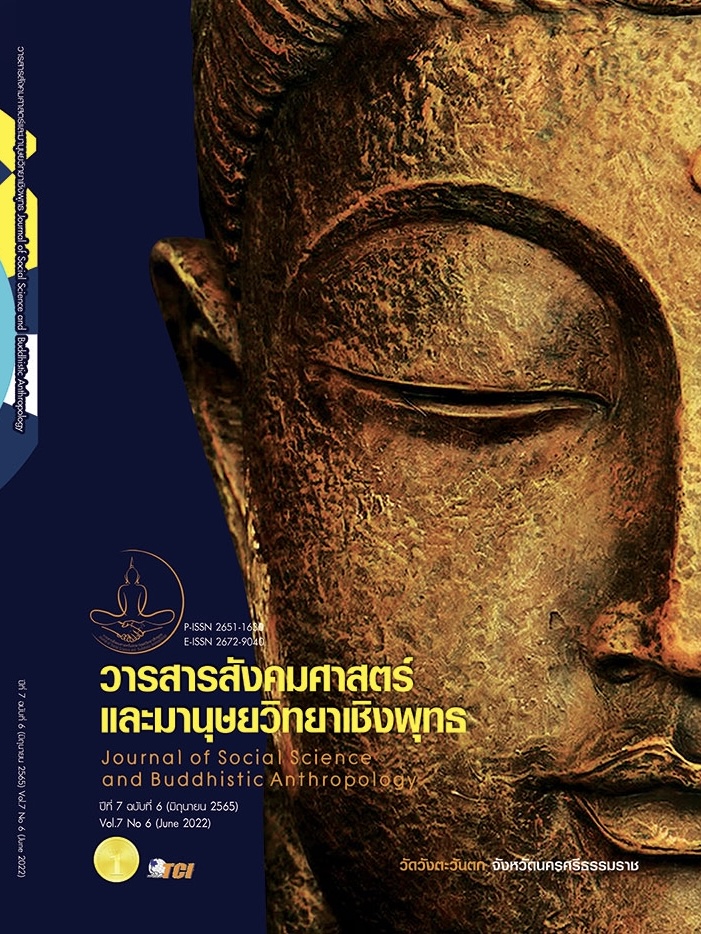GUIDELINES FOR ACADEMIC ADMINISTRATION OF PRIMARY SCHOOLS IN THE DIGITAL AGE
Keywords:
Guidelines for Academic Administration, Digital age, Primary SchoolsAbstract
The objectives of this research article ware to 1) explore the components of academic administration of schools, 2) confirm the consistency of the components of academic administration of schools with empirical data, and 3) create guidelines for the academic administration of primary schools in the digital age. This study was a mixed methodology. Samples consisted of administrators and teachers in schools under the Primary Educational Service Area Office in Eastern Region totaling 450, were obtained by the table of Krejcie and Morgan, multi - stage sampling method, and cluster random sampling. The instruments used for data collection were 1) semi - structured interview; 2) questionnaire; 3) focus Group Discussion Form. The statistics used for data analysis were frequency, percentage, mean, Standard Deviation, skewness, kurtosis, Exploratory Factor Analysis, Confirmatory Factor Analysis and content analysis. The results showed that: 1) The components of academic administration of schools consisted of 7 components as follows: The use of digital technology in teaching and learning management of teachers and learners, Enhancing a learning culture that facilitates change by using modern information technology, Organizing learning and research resources to develop learners' potential, Curriculum Development and Evaluation, Education guidance, Foreign language skills development, and Academic administration system development and collaboration with other educational institutions/organizations both domestically and internationally 2) Components of academic administration of schools was consistent with the empirical data swith statistical significance at 0.01 3) Guidelines academic administration of schools in the hools of each component were created as follows; Component 1 with five guidelines, Component 2 with three guidelines, Component 3 with six guidelines, Component 4 with four guidelines, Component 5 with five guidelines, Component 6 with five guidelines, and Component 7 with four guidelines.
References
ชวัลลักษ์ รติวรภัทรกุล. (2559). การพัฒนารูปแบบการบริหารงานวิชาการที่มีประสิทธิผลสำหรับโรงเรียนขนาดเล็ก สังกัดสำนักงานเขตพื้นที่การศึกษามัธยมศึกษาภาคตะวันออกเฉียงเหนือ. ใน ดุษฎีนิพนธ์ครุศาสตรปรัชญาดุษฎีบัณฑิต สาขาวิชาการบริหารการศึกษาและภาวะผู้นำ. มหาวิทยาลัยราชภัฏสกลนคร.
ปรียาพร วงศ์อนุตรโรจน์. (2535). การบริหารงานวิชาการ. กรุงเทพมหานคร: สหมิตรออฟเซต.
วิไล ปรึกษากร. (2558). นวัตกรรมการบริหารงานวิชาการของผู้บริหารสถานศึกษาขั้นพื้นฐาน. ใน ดุษฎีนิพนธ์ปรัชญาดุษฎีบัณฑิต สาขาวิชาการบริหารการศึกษา. มหาวิทยาลัยศิลปากร.
ศักดิ์ดนัย โรจน์สราญรมย์. (2562). กลยุทธ์การบริหารวิชาการโรงเรียนมัธยมศึกษาตามแนวคิดความฉลาดรู้ทางดิจิทัลของนักเรียน. ใน ดุษฎีนิพนธ์ครุศาสตรดุษฎีบัณฑิต สาขาวิชาบริหารการศึกษา. จุฬาลงกรณ์มหาวิทยาลัย.
สมพงษ์ เตชรัตนวรกุล. (2561). การวิเคราะห์ตัวบ่งชี้เกณฑ์การประเมินคุณภาพการจัดการศึกษาโรงเรียนมัธยมศึกษา. ใน ดุษฎีนิพนธ์ปรัชญาดุษฎีบัณฑิต สาขาวิชาการบริหารการศึกษา. มหาวิทยาลัยศิลปากร.
สำนักงานเลขาธิการสภาการศึกษา. (2551). ยุทธศาสตร์การพัฒนาคุณภาพการศึกษา. ระเบียบวาระแห่งชาติ (พ.ศ. 2551 - 2555). กรุงเทพมหานคร: พริกหวานกราฟฟิค.
อรชร วรรณสอน. (2563). อนาคตภาพการบริหารงานวิชาการของโรงเรียนในสังกัดเทศบาล เพื่อรองรับการพัฒนาทักษะผู้เรียนในศตวรรษที่ 21. ใน ดุษฎีนิพนธ์ปรัชญาดุษฎีบัณฑิต สาขาวิชาการบริหารการศึกษา. มหาวิทยาลัยศิลปากร.
Krejcie, R. V. & Morgan, D. W. (1970). Determining Sample Size for Research Activity. Journal of Education and Psychological Measurement, 30(3), 607-610.
Rothidsathan. (2016). Policy of Higher Education. Retrieved July 20, 2021, from http://www.moe.go.th/websm/2016/sep/385.ht2.jpg
Stratton, L. S. et al. (2014). Modeling enrollment in and completion of vocational education: The role of Cognitive and Non - Cognitive skills by program type. Retrieved February 10, 2016, from https://docs.iza.org/dp10741.pdf
Downloads
Published
How to Cite
Issue
Section
License
Copyright (c) 2022 Journal of Social Science and Buddhistic Anthropology

This work is licensed under a Creative Commons Attribution-NonCommercial-NoDerivatives 4.0 International License.









